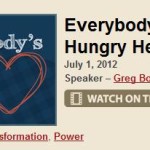We run our website the way we wished the whole internet worked: we provide high quality original content with no ads. We are funded solely by your direct support. Please consider supporting this project.

What Type of Faith Do You Have?
Genesis 32 tells the story of Jacob, wrestling through the night with a nameless man, revealed to be none other than God Himself. We read that when this man “saw that he could not overpower” Jacob, he “touched the socket of Jacob’s hip so that his hip was wrenched as he wrestled with the man” (v. 25).
It is only at daybreak, after a long night of wrestling, that the Lord entreats Jacob to end his struggle (v. 26). However, Jacob refuses to release his grip until he receives a blessing. The Lord responds by asking, “What is your name?” This request leads to the punch line of the story. Apparently willing to do whatever it takes to receive a “blessing” from his wrestling partner, Jacob gives his name, at which point the Lord immediately informs him that his name is about to change. From now on, the Lord says, Jacob will be called Israel because he has “struggled with God and with human beings and overcome.”
“Jacob” did not become “Israel” because he overpowered the Lord, but because he had the audacity to wrestle with God, holding on until he received the “blessing” for which he fought. This new christening speaks to what I call an Israelite Faith: a faith that calls for the courage to struggle honestly with the Creator, having even the audacity to wrestle in pursuit of blessing.
However, there is more to this name change. The meaning of “Jacob” in popular usage of the time literally means “heel catcher,” for Jacob was born grabbing the heel of his twin brother, Esau (Gen 25:26). It has the connotation of one who connives to supplant another, and the story of Jacob bears this out as he was a true trickster.
The meaning of “Jacob” challenges our ordinary conceptions of faith and how it works. Often, what masquerades as faith is really a form of mental trickery: we artificially convince ourselves, side-step hard questions, and avoid at all cost the courageous wrestling God here applauds. We follow disingenuously, trying to believe the right things, use the right pious language, and act in the right ways in order to get something from God, whether it be salvation or healing or some other blessing.
When we do this, we do not base our faith on an honest and rational evaluation of the merits of what we profess to believe. Rather, we avoid facts and arguments that might shake our faith. In other words, much of what we call faith today is Jacob-like, not Israel-like.
The biblical heroes of the faith are better known for their willingness to be uncomfortable and to wrestle honestly with God. We see this in Genesis 18 with Abraham, who questioned God’s justice. Moses objected to God’s plans to destroy the Israelites in Exodus 32. Jeremiah objected to God’s actions—or at least what he thought were his actions (Jer 12:1; 14:8-9). And Habakkuk expressed his anger and confusion about God’s apparent inconsistency.
Israelite faith is not a faith centered on right beliefs and pious, religious language. And it’s certainly not a faith that focuses on fostering a sense of security at cost to real reflection. Rather, it’s a faith so grounded in authenticity that is unwilling to sweep questions, doubts, and complaints under a pious rug to avoid pain and uncertainty. It’s a faith that is not afraid to go to the mat with God.
—Adapted from Benefit of the Doubt, pages 78-83
Category: General
Tags: Faith, Israel, Jacob
Topics: Faith & Doubt
Related Reading

What Does ‘Your Faith Has Healed You’ Mean? (podcast)
Greg discusses faith, doubt, and healings. Episode 486 http://traffic.libsyn.com/askgregboyd/Episode_0486.mp3

Why Bart Ehrman Doesn’t Have to Ruin Your Christmas (Or Your Faith) Part 3
This is the third of several videos Greg put together to refute Bart Ehrman’s claims published in the article What Do We Really Know About Jesus? If you missed the first two installments you can find them here and here.

The Heresy of “Just War”
Since the time when the Jesus-looking kingdom movement was transformed into the Caesar-looking “militant and triumphant” Church, there has been a tradition of Christians by-passing the enemy-loving, non-violent teachings of the NT and instead appealing to the precedent of divinely-sanctioned nationalism and violence in the OT whenever they felt the need to justify engaging in…

Everybody’s Got A Hungry Heart [Sermon, 7/1/12]
Check out Greg’s latest sermon!
Description from WHC website:
Paul wrote the Colossians to confront a false religion of invoking angels. These invocations were being done because people thought Jesus wasn’t enough. This same type of thought pervades our own society, where people with hungry hearts are searching for more than what Jesus offers. In this sermon, Greg talks about the fullness that Jesus brings.

Secret Doubt
J L via Compfight We don’t usually do this, but Jessica Kelley (Henry’s mom) over at Jess in Process wrote a piece about her struggles with doubt, and we got her permission to reprint it in its entirety. She perfectly represents the basic premise of Greg’s upcoming book Benefit of the Doubt. Thanks Jess! Secret…

What Will You Do With Your Doubt?
Richard Beck shared some of his thoughts on Christianity as something that for many of us is our “native religion”…something we were born into and that is, to quote Wendell Berry, “an intimate belonging of our being; it informs our consciousness, our language, and our dreams.” With Christianity so foundational to our identities, doubt is a…
